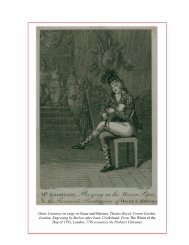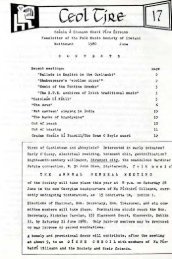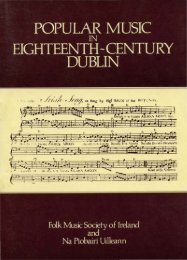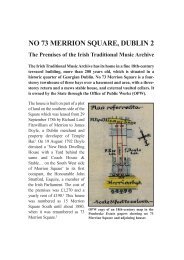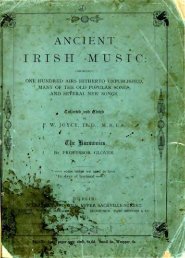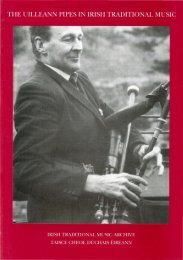Union Pipes - Irish Traditional Music Archive
Union Pipes - Irish Traditional Music Archive
Union Pipes - Irish Traditional Music Archive
Create successful ePaper yourself
Turn your PDF publications into a flip-book with our unique Google optimized e-Paper software.
11<br />
InTrODUCTIOn OF ‘UnIOn PIPeS’<br />
of a threatening Continental religion, and they spoke a barbarous tongue,<br />
<strong>Irish</strong>. The country had long been colonised and ruled by Britain but never<br />
completely subdued. Agrarian disturbances were widespread there in the<br />
1780s, and even the Protestant ascendancy of its Dublin-based colonial<br />
parliament was showing disquieting signs of legislative independence<br />
during the decade. Those of its aristocrats who lived in london were<br />
largely absentee landlords of British origins, unsympathetic to <strong>Irish</strong> indigenous<br />
culture, and while they formed dining clubs in the city there is<br />
no evidence that they offered patronage to <strong>Irish</strong> musicians. Most of the<br />
city’s <strong>Irish</strong> population belonged to its often troublesome underclass.<br />
For these and other reasons, <strong>Irish</strong> music is poorly represented in london<br />
publications and in public performance before Courtney’s time. no<br />
separate collection of <strong>Irish</strong> music had been published there, and when<br />
<strong>Irish</strong> melodies are published in london from the mid-seventeenth century<br />
they appear as stray items in anthologies or as afterthoughts in collections<br />
of ‘english, Scottish and <strong>Irish</strong>’ tunes. The few ‘<strong>Irish</strong>’ songs known are<br />
mainly comic stage pieces put into the mouths of <strong>Irish</strong> servants; few of<br />
the many <strong>Irish</strong> actors in london specialised in <strong>Irish</strong> song. As the British<br />
music historian Sir John hawkins said in about 1785: ‘I know of no <strong>Irish</strong><br />
airs so much celebrated in england as the Scotch have been’. 24<br />
This situation began to change in london in the 1780s: the Dublin<br />
dramatist John O’Keefe introduced harp tunes by the famous <strong>Irish</strong><br />
be seen below, some of the Society’s prizewinners were briefly introduced to<br />
the london stage in later 1788 and in 1791. The Society itself sometimes<br />
engaged <strong>Irish</strong> bellows pipers, including Murphy, Courtney, McDonnell and<br />
O’Farrell mentioned below, to play at their social occasions in london, and also<br />
(along with Murphy) a ‘piper – Allan’ who may have been the famous<br />
northumbrian piper James Allan (see Sanger 2011: 21 and nlS MS highland<br />
Society of london Dep. 268/34 from which a facsimile of extracts was supplied<br />
to the writer courtesy of Keith Sanger).<br />
24<br />
letter to Joseph Cooper Walker quoted in Walker 1786: 66. hawkins excepted only ‘The<br />
Black Joke’, correctly regarding this as being an <strong>Irish</strong> tune of modern composition.



